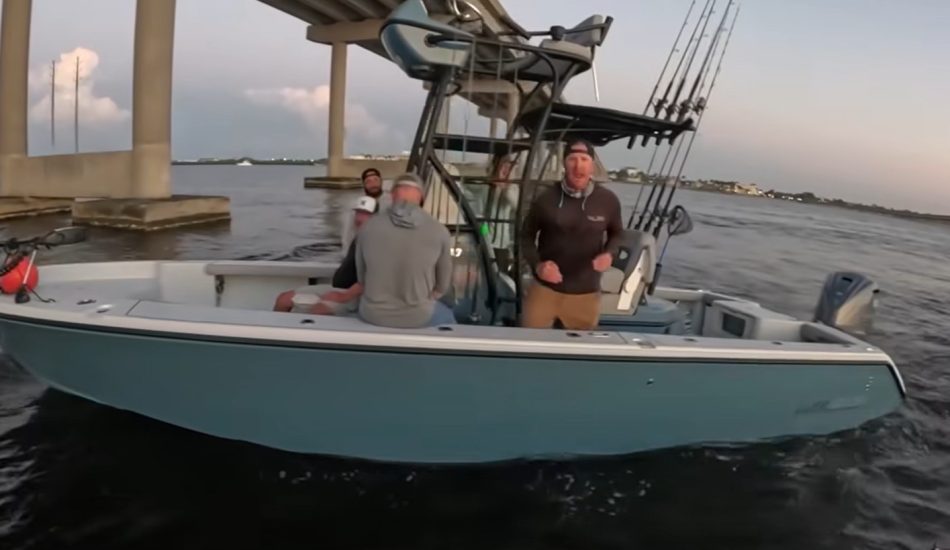Legal Comment on the Captain Brock Horner Boat Case

What the Captain Horner Viral Video May Reveal About Florida Criminal Law
If you’ve been on social media recently, you’ve likely seen the viral video involving Captain Brock Horner. In it, Horner climbs aboard a young man’s boat and issues threats of violence, despite the young man’s efforts to de-escalate. The video has drawn widespread national attention. You can view it here:
Facebook Video Link
Let us be clear: The Brancato Law Firm, P.A. does not condone Mr. Horner’s actions. We are not affiliated with him, are not seeking to represent him, and have no involvement in his case. Our purpose in discussing this incident is purely educational—to explore the legal implications of a viral event that has raised valid public questions.
What Charges Could Be Filed?
The footage raises legitimate legal questions about what charges could result from such behavior under Florida law. Most notably, this conduct could support allegations of assault and burglary of a conveyance—terms that carry specific legal meanings and serious consequences.
For example, if the prosecutor files a single charge of burglary with assault, it becomes a first-degree felony punishable by up to life in prison. While few would argue that the incident justifies such a sentence, combining these charges gives the State leverage in negotiations. Outcomes could range from problem-solving court referral to probation or incarceration.
If Mr. Horner is a licensed boat captain, professional licensing consequences may also come into play.
Some have even suggested piracy might apply. While the nautical setting invites that comparison, piracy is a rare and typically federal charge. In more than 25 years of practice, this writer has never seen such a charge filed in state court, and there’s little indication this case would be removed to federal jurisdiction.
Would the Young Man Have Been Justified in Using Force?
The young man in this case acted commendably, arguably with more intellect and restraint than many more “mature” human beings. One question that continues to surface is whether the young man on the boat would have been legally justified in using force—possibly even deadly force—in response to the intrusion.
Under Florida’s Stand Your Ground and self-defense laws, the answer may be yes.
Florida law creates a presumption of fear when someone unlawfully enters an occupied conveyance, which includes a boat. In this case, the video clearly shows an enraged intruder climbing aboard and issuing threats. He also claimed to be a military Ranger. Whether that claim was true is legally irrelevant; what matters is what the young man reasonably believed at the time.
The law requires that the fear be objectively reasonable—and many jurors would likely agree that it was. If the young man had been armed and had used force to defend himself, there is a strong legal argument that such force would have been justified under Florida Statutes §§ 776.012 and 776.013.
Why Discuss This Case?
Beyond its viral moment, the Horner incident touches on a broader issue: how the criminal justice system treats veterans who may be struggling with service-related mental health conditions.
That’s where Veterans Treatment Court (VTC) comes in—a specialized program offering structured treatment and accountability rather than traditional prosecution for eligible veterans. It’s not about excusing unlawful behavior—it’s about addressing the underlying issues that may have led to it.
What Is Veterans Treatment Court?
Veterans Treatment Court is a judicial program that connects eligible veterans with resources from the U.S. Department of Veterans Affairs, behavioral health providers, and veteran mentors. Its focus is on rehabilitation and recovery, while maintaining strict accountability.
In Hillsborough County, the VTC follows a team-based approach that includes:
- Access to VA treatment and support services
- Ongoing mentorship from fellow veterans
- Frequent court monitoring and structured compliance
It is a demanding program, not a shortcut. Participants are expected to fully engage in treatment and adhere to court orders.
Who Is Eligible?
Eligibility for Veterans Treatment Court in Hillsborough County is governed by Florida Statutes §§ 948.08, 948.16, and 948.21. You may qualify if:
- Military Status
- U.S. military veteran (any discharge type)
- Active-duty service member
- Former DoD contractor
- Veteran of an allied foreign military
- Service-Related Condition
- PTSD, TBI, depression, anxiety
- Substance use disorder
- Other behavioral or psychological disorders
- Qualifying Offense
- Misdemeanor
- City or county ordinance violation
- Certain felonies (excluding serious felonies under §948.06(8)(c))
- Voluntary Participation
- Must consent to treatment, court supervision, and follow program rules
Admission is not automatic—even if all criteria are met, entry into the program is up to the Veterans Court judge. A thorough legal and personal background presentation is often critical to that decision.
Why It Matters
In Hillsborough County, VTC is overseen by a judge who is also a military reservist and combat veteran, bringing unique perspective to the bench. The court’s goal is not to stigmatize, but to support veterans through accountability, structure, and access to care.
For those who complete the program successfully, the court may even dismiss the underlying charges, offering a true path to rebuilding.
Final Thought
After watching the video, many people understandably feel that Captain Horner does not deserve leniency. That reaction is valid—and it reflects the public’s strong sense of justice and safety.
But legal outcomes are based not on emotions alone, but on a careful application of facts and law. A competent defense attorney will likely conduct a complete background workup on Mr. Horner, examining any possible history of service-related trauma, mental health conditions, or other mitigating factors. That process belongs in the courtroom—not on social media—and should be handled by professionals, including lawyers, judges, and treatment providers, not by the court of public opinion.



